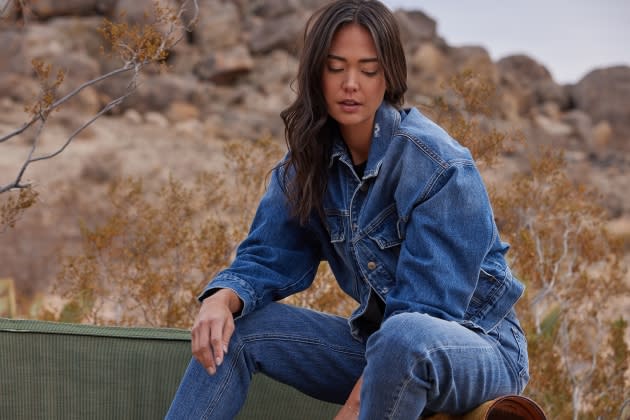Sunrise Brands Prepares for Major Expansion With Recently Acquired Labels

A little more than a year ago, Sunrise Brands in Los Angeles acquired three high-end contemporary California labels whose owner had gone bankrupt.
The acquisition of the Joie, Equipment and Current/Elliott brands in July 2021 was just one more recent addition to the company’s roster of labels, which now include NYDJ, or Not Your Daughter’s Jeans, bought in 2019; Donald Pliner, acquired in 2020, and Rebecca Minkoff.
More from WWD
Now Gerard Guez, the chairman and chief executive officer of Sunrise Brands, formerly called Tarrant Apparel Group, is working with his partner of 42 years, Vice Chairman Todd Kay, to position the labels for major growth while making sure costs are efficient. “When we buy a company, we really try to clean it up,” Guez said. “We’ve developed a knack for that.”
To cut costs, the company recently signed a lease for a large warehouse facility with 446,000 square feet of space at the Tejon Ranch Co. industrial park, some 60 miles north of Los Angeles. The warehouse rents are much cheaper than what the company is paying in Los Angeles for three structures that provide 350,000 square feet of footage.
With the new warehouse building’s 36-foot-high ceilings, Sunrise Brands can add another 30 percent of space to the ground floor to have about 600,000 square feet of capacity.
While the new Sunrise Brands distribution facility is being built to open in early 2024, the apparel company will temporarily occupy a 240,000-square-foot building owned by Tejon Ranch Co. and its joint venture partner, Majestic Realty Co.
More distribution is just one aspect of boosting the company’s growth in various areas, including e-commerce. Before the COVID-19 pandemic, Sunrise Brands had no e-commerce. Now it makes up 20 percent of the company’s more than $350 million in annual revenues, Guez said.
Sunrise Brands has a long history of making clothing in China. In 1985, Guez launched Tarrant Co., the predecessor of today’s company, in Hong Kong to manufacture apparel for other companies. By 1988, the company was making and designing exclusively for Limited Express Stores. It has also manufactured merchandise for retailers including Chico’s, Walmart and Kohl’s and still produces about 75 percent of its goods in China.
For years Guez continued manufacturing private-label goods for other companies. Even though it was a low-profit-margin venture, it still made millions of dollars.
Then about 20 years ago, department stores brought their private-label business in-house, setting up their own sourcing divisions and hiring designers.
That’s when Guez knew he had to change his business model and create his own brands. In 2003, he developed the American Rag Cie label, licensed with Mark Werts, who runs a Los Angeles denim store of the same name.
The collections were designed for the juniors market and sold exclusively to Macy’s for 20 years until that contract recently expired and was not renewed. “Over the lifetime of the contract, the brand had $3 billion in retail sales,” Guez said. “Now we are repositioning American Rag to be a fun, casual young contemporary brand with [retail] price points between $90 and $150. We will probably be selling it in department stores again.”
Also in 2003, Guez acquired the Seven7 Jeans license, a moderate-priced denim label that now generates $100 million in wholesale revenues, Guez said.
With new brands have come new opportunities. Ever since acquiring the Donald Pliner label in 2020, the Los Angeles company has built up an $80 million leather division making shoes and handbags, Guez said. That should grow to a $100 million division in the next two years with shoes being developed for NYDJ, Rebecca Minkoff and Joie.
The L.A. venture’s brand-buying spree has been made possible by the pandemic, which crushed a number of retailers and manufacturers that were not able to recuperate from the financial blow of closed stores and rare shoppers.
The Joie, Equipment and Current/Elliott labels came up for sale after The Collected Group, the parent of the three brands, filed for bankruptcy reorganization in 2021.
After restructuring, KKR, a lender to the bankrupt company, converted its debt holdings into ownership and then sold the labels to Sunrise Brands.
The pandemic also had a devastating effect on Rebecca Minkoff, who Guez said did not get any products delivered from her Vietnamese factories for seven months during the COVID-19 lockdowns. Furthermore, the designer’s retail clients were hit hard by the pandemic.
After the sale, Rebecca Minkoff, who launched the company in 2005 with the “Morning After Bag,” stayed on as the brand’s creative director.
Gerard Guez and his brothers have been in the apparel industry for more than four decades. His older brother Paul launched Sasson Jeans in Los Angeles in 1976. The company quickly became a multimillion-dollar venture in the early 1980s before it went bankrupt in the mid-1980s. Paul went on to start various denim ventures, including Blue Holdings Inc. He is now CEO of Current/Elliott.
Starting in the 1990s, Hubert Guez was CEO of Azteca Production International, which made blue jeans in Mexico for various retailers and U.S. companies. He later became the CEO of Ed Hardy, an apparel company started by Christian Audigier. Hubert Guez is now the CEO of NYDJ.
